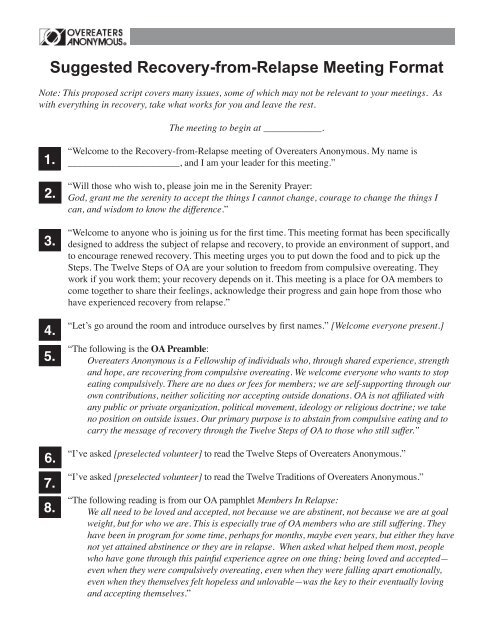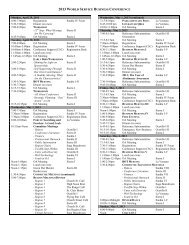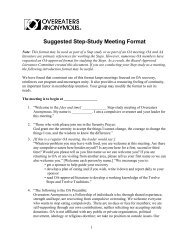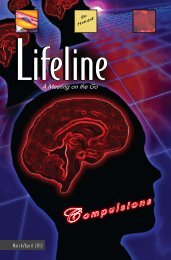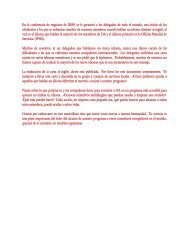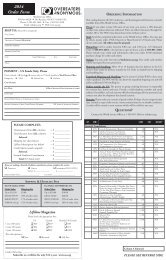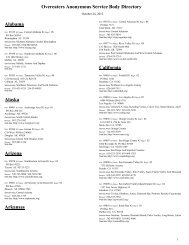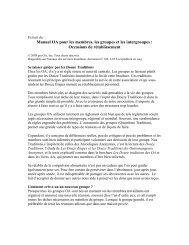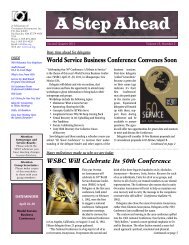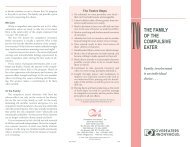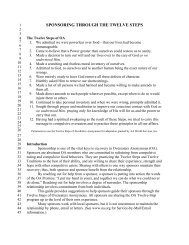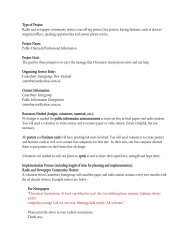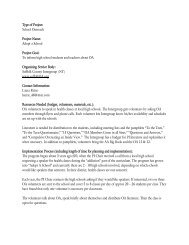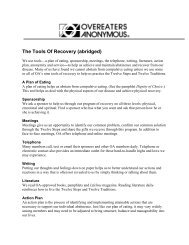Recovery from Relapse Meeting Format - Overeaters Anonymous
Recovery from Relapse Meeting Format - Overeaters Anonymous
Recovery from Relapse Meeting Format - Overeaters Anonymous
Create successful ePaper yourself
Turn your PDF publications into a flip-book with our unique Google optimized e-Paper software.
Suggested <strong>Recovery</strong>-<strong>from</strong>-<strong>Relapse</strong> <strong>Meeting</strong> <strong>Format</strong><br />
Note: This proposed script covers many issues, some of which may not be relevant to your meetings. As<br />
with everything in recovery, take what works for you and leave the rest.<br />
The meeting to begin at ____________.<br />
1.<br />
2.<br />
3.<br />
4.<br />
5.<br />
6.<br />
7.<br />
8.<br />
“Welcome to the <strong>Recovery</strong>-<strong>from</strong>-<strong>Relapse</strong> meeting of <strong>Overeaters</strong> <strong>Anonymous</strong>. My name is<br />
_______________________, and I am your leader for this meeting.”<br />
“Will those who wish to, please join me in the Serenity Prayer:<br />
God, grant me the serenity to accept the things I cannot change, courage to change the things I<br />
can, and wisdom to know the difference.”<br />
“Welcome to anyone who is joining us for the first time. This meeting format has been specifically<br />
designed to address the subject of relapse and recovery, to provide an environment of support, and<br />
to encourage renewed recovery. This meeting urges you to put down the food and to pick up the<br />
Steps. The Twelve Steps of OA are your solution to freedom <strong>from</strong> compulsive overeating. They<br />
work if you work them; your recovery depends on it. This meeting is a place for OA members to<br />
come together to share their feelings, acknowledge their progress and gain hope <strong>from</strong> those who<br />
have experienced recovery <strong>from</strong> relapse.”<br />
“Let’s go around the room and introduce ourselves by first names.” [Welcome everyone present.]<br />
“The following is the OA Preamble:<br />
<strong>Overeaters</strong> <strong>Anonymous</strong> is a Fellowship of individuals who, through shared experience, strength<br />
and hope, are recovering <strong>from</strong> compulsive overeating. We welcome everyone who wants to stop<br />
eating compulsively. There are no dues or fees for members; we are self-supporting through our<br />
own contributions, neither soliciting nor accepting outside donations. OA is not affiliated with<br />
any public or private organization, political movement, ideology or religious doctrine; we take<br />
no position on outside issues. Our primary purpose is to abstain <strong>from</strong> compulsive eating and to<br />
carry the message of recovery through the Twelve Steps of OA to those who still suffer.”<br />
“I’ve asked [preselected volunteer] to read the Twelve Steps of <strong>Overeaters</strong> <strong>Anonymous</strong>.”<br />
“I’ve asked [preselected volunteer] to read the Twelve Traditions of <strong>Overeaters</strong> <strong>Anonymous</strong>.”<br />
“The following reading is <strong>from</strong> our OA pamphlet Members In <strong>Relapse</strong>:<br />
We all need to be loved and accepted, not because we are abstinent, not because we are at goal<br />
weight, but for who we are. This is especially true of OA members who are still suffering. They<br />
have been in program for some time, perhaps for months, maybe even years, but either they have<br />
not yet attained abstinence or they are in relapse. When asked what helped them most, people<br />
who have gone through this painful experience agree on one thing: being loved and accepted—<br />
even when they were compulsively overeating, even when they were falling apart emotionally,<br />
even when they themselves felt hopeless and unlovable—was the key to their eventually loving<br />
and accepting themselves.”
9.<br />
Tools<br />
“In OA, the Statement on Abstinence and <strong>Recovery</strong> is ‘Absinence is the action of refraining <strong>from</strong><br />
compulsive eating and compulsive food behaviors while working towards or maintaining a healthy<br />
body weight. Spiritual, emotional and physical recovery is the result of living the <strong>Overeaters</strong><br />
<strong>Anonymous</strong> Twelve-Step program.’ The OA tools of recovery help us work the Steps and refrain<br />
<strong>from</strong> compulsive eating. The nine tools are: a plan of eating, sponsorship, meetings, telephone,<br />
writing, literature, action plan, anonymity and service. For more information, read the Tools of<br />
<strong>Recovery</strong> pamphlet.<br />
We will now circulate our telephone list. Please write down your number, and we suggest you take down<br />
two or more numbers to call during the week. We will keep this list circulating throughout the meeting.”<br />
10.<br />
Sponsors<br />
“We cannot work this program by ourselves. We have found it indispensable to call on the support<br />
of a sponsor for guidance in working our three-fold program of recovery. Sponsorship is one of<br />
our keys to success. Sponsors are OA members committed to abstinence and to living the Steps<br />
and Traditions to the best of their ability. Sponsors share their program up to the level of their<br />
experience, and strengthen their recovery through this service to others. To find a sponsor, look for<br />
someone who has what you want, and ask that member how she or he is achieving it. Would all<br />
abstinent sponsors please identify themselves.”<br />
11.<br />
12.<br />
13.<br />
SEVENTH TRADITION: “According to our Seventh Tradition, we are self-supporting through<br />
our own contributions. Our group expenses are ______, _______, and _____. We send monthly<br />
contributions to our intergroup, service board, region and the WSO to help carry the message to other<br />
compulsive overeaters. Give as if your life depends on it! We encourage OA members to give as<br />
much as they are able, to help our group be self-supporting. The suggested donation is $3 or more.<br />
REPORTS: Secretary’s report, treasurer’s report and any OA related announcements.<br />
[You may wish to choose one of the following items to be used every week, or alternate among<br />
them on different weeks of the month.]<br />
• Leader/guest speaks for 15-20 minutes sharing experience, strength and hope<br />
on relapse and recovery. [Other topics could include “The Solution Is in the Steps,”<br />
“<strong>Recovery</strong> in God’s Time, Not Mine,” “Positive Action Strengthens <strong>Recovery</strong>,” etc.]<br />
• Leader begins a story in OA’s A New Beginning: Stories of <strong>Recovery</strong> <strong>from</strong> <strong>Relapse</strong>.<br />
Each member reads one or two paragraphs and may share on the reading.<br />
• Use “Been Slipping and Sliding? A Reading and Writing Tool” (Twelfth-Step-Within<br />
Handbook, Appendix D or download <strong>from</strong> www.oa.org) Leader may choose one question<br />
as the topic; members may take turns reading paragraphs <strong>from</strong> the suggested reading. The<br />
remainder of the meeting time may be used for reading and discussion or discussion only<br />
on the question.<br />
[Optional: <strong>Meeting</strong> members may decide to do whatever works best for them: speakers every week,<br />
readings every week, reading/writing every week or alternating these activities.]
14.<br />
RECOVERY INSURANCE POLICY (OPTIONAL)<br />
“This meeting uses the <strong>Recovery</strong> Insurance Policy, a commitment between two members to<br />
support each other’s recovery. It can be found on our literature table; you may wish to take time<br />
during our break or after the meeting to make a pledge to an OA friend.”<br />
[You can find the “<strong>Recovery</strong> Insurance Policy”attached.]<br />
15.<br />
16.<br />
FIVE- OR TEN-MINUTE BREAK (OPTIONAL):<br />
[If your meeting chooses to have a break, you could ask volunteers to serve as greeters to speak<br />
with those new or returning to the meeting.]<br />
“May we have two volunteers to serve as greeters? Please see these members during the break<br />
for any questions you may have.”<br />
SUGGESTED GUIDELINES FOR SHARING:<br />
[We suggest you read the following before members begin sharing. Your group may modify this to<br />
better suit its needs.]<br />
“As you share your experience and strength in OA, please also share your hope. Please<br />
confine your sharing to your experience with the disease of compulsive eating, the solution<br />
offered by OA and your own recovery <strong>from</strong> the disease, rather than just the events of the day<br />
or week. If you are having difficulties, share how you use the program to deal with them. If<br />
you need to talk more about your difficulties and seek solutions, we suggest you speak to your<br />
sponsor and other members after the meeting.<br />
Feedback, cross talk and advice-giving are discouraged here. Cross talk during an OA<br />
meeting is giving advice to others who have already shared, speaking directly to another<br />
person rather than to the group, and questioning or interrupting the person speaking/sharing at<br />
the time.”<br />
This meeting is now open for sharing. Please limit your sharing to (suggest three to five minutes)<br />
so more members may have a chance to share.” [Optional: You may appoint someone to be a timer<br />
to remind members when the time has elapsed.]<br />
17.<br />
CLOSING:<br />
“By following the Twelve Steps, attending meetings regularly, and using the OA tools, thousands<br />
have changed their lives. We offer hope and encouragement.”<br />
[To the newcomer, we suggest attending at least six different meetings before deciding if OA is for<br />
you.]<br />
“The opinions expressed here today are those of individual OA members and do not represent OA<br />
as a whole. Please remember our commitment to honor each other’s anonymity. ‘Whom you see<br />
here, What you hear here, When you leave here, Let it stay here.’ Let us all reach out by phone or<br />
email to newcomers, returning members and each other. Together we get better. We hope that this<br />
meeting has given you renewed hope, strength and encouragement. Please keep coming back, no<br />
matter what.
“Thank you for allowing me to be your leader. After a moment of silence, will those who wish to<br />
please join us in …[Closing of your choice. The 1993 Business Conference suggests that meetings<br />
be closed with the Serenity Prayer, the Seventh-Step Prayer, the Third-Step Prayer, or the OA<br />
Promise ‘I Put My Hand in Yours.’]”<br />
[<strong>Meeting</strong>s may last one hour, one-and-a-half hours or up to two hours.]<br />
<strong>Overeaters</strong> <strong>Anonymous</strong>®, Inc.<br />
World Service Office<br />
www.oa.org<br />
6075 Zenith Ct. NE, Rio Rancho, NM 87144-6424 USA<br />
Mail Address: P.O. Box 44020, Rio Rancho, NM 87174-4020 USA<br />
Tel: 1-505-891-2664 • Fax: 1-505-891-4320<br />
© 1989 . . . 2013 <strong>Overeaters</strong> <strong>Anonymous</strong> ®, Inc. All rights reserved.
This is a pledge between two OA members to support and be accountable to one another. If you think this agreement could be helpful for you, fill out<br />
your name and other information as the “I” on one side of the form and have another OA member complete the other half. Cut the forms apart and exchange<br />
sides. Place the agreement in a prominent spot to remind you of your commitment to recovery and service.<br />
RECOVERY INSURANCE POLICY<br />
RECOVERY INSURANCE POLICY<br />
I, ______________________________ on this day do hereby<br />
give _______________________________ (a recovering OA<br />
member) permission to take me to a meeting if she/he does not<br />
receive a phone call <strong>from</strong> me within _____ days of our last conversation;<br />
or if she/he does not see me at an OA meeting within<br />
the last _____ weeks. She/he has the right to use all means of<br />
communication to contact me, including contacting ______<br />
____________________________ (a friend/relative) for assistance.<br />
This agreement may only be terminated after we have<br />
had contact and mutually agree to end this agreement.<br />
Signed:________________________ Date: _____________<br />
My address:______________________________________<br />
_______________________________________________<br />
_______________________________________________<br />
My phone numbers:________________________________<br />
_______________________________________________<br />
My email:________________________________________<br />
Friend/relative’s phone no.: __________________________<br />
I, ______________________________ on this day do hereby<br />
give _______________________________ (a recovering<br />
OA member) permission to take me to a meeting if she/he does<br />
not receive a phone call <strong>from</strong> me within _____ days of our last<br />
conversation; or if she/he does not see me at an OA meeting<br />
within the last _____ weeks. She/he has the right to use all<br />
means of communication to contact me, including contacting<br />
__________________________________ (a friend/relative)<br />
for assistance. This agreement may only be terminated after we<br />
have had contact and mutually agree to end this agreement.<br />
Signed:________________________ Date: _____________<br />
My address:______________________________________<br />
_______________________________________________<br />
_______________________________________________<br />
My phone numbers:________________________________<br />
_______________________________________________<br />
My email:________________________________________<br />
Friend/relative’s phone no.: __________________________<br />
Always to extend the hand and heart<br />
of OA to all who share my compulsion;<br />
for this I am responsible.<br />
Always to extend the hand and heart<br />
of OA to all who share my compulsion;<br />
for this I am responsible.
Our invitation to you<br />
We of <strong>Overeaters</strong> <strong>Anonymous</strong> have made a discovery. At the very first meeting we attended, we<br />
learned that we were in the clutches of a dangerous illness, and that willpower, emotional health and<br />
self-confidence, which some of us had once possessed, were no defense against it.<br />
We have found that the reasons for the illness are unimportant. What deserves the attention<br />
of the still-suffering compulsive overeater is this: there is a proven, workable method by which we can<br />
arrest our illness.<br />
The OA recovery program is patterned after that of Alcoholics <strong>Anonymous</strong>. We use AA’s<br />
Twelve Steps and Twelve Traditions, changing only the words “alcohol” and “alcoholic” to “food” and<br />
“compulsive overeater.”<br />
As our personal stories attest, the Twelve-Step program of recovery works as well for compulsive<br />
overeaters as it does for alcoholics.<br />
Can we guarantee you this recovery? The answer is simple. If you will honestly face the truth<br />
about yourself and the illness; if you will keep coming back to meetings to talk and listen to other<br />
recovering compulsive overeaters; if you will read our literature and that of Alcoholics <strong>Anonymous</strong><br />
with an open mind; and, most important, if you are willing to rely on a power greater than yourself for<br />
direction in your life, and to take the Twelve Steps to the best of your ability, we believe you can indeed<br />
join the ranks of those who recover.<br />
To remedy the emotional, physical and spiritual illness of compulsive overeating we offer several<br />
suggestions, but keep in mind that the basis of the program is spiritual, as evidenced by the Twelve<br />
Steps.<br />
We are not a “diet and calories” club. We do not endorse any particular plan of eating. We<br />
practice abstinence by staying away <strong>from</strong> eating between planned meals and <strong>from</strong> all individual binge<br />
foods. Once we become abstinent, the preoccupation with food diminishes and in many cases leaves us<br />
entirely. We then find that, to deal with our inner turmoil, we have to have a new way of thinking, of<br />
acting on life rather than reacting to it—in essence, a new way of living.<br />
From this vantage point, we begin the Twelve-Step program of recovery, moving beyond the<br />
food and the emotional havoc to a fuller living experience. As a result of practicing the Steps, the<br />
symptom of compulsive overeating is removed on a daily basis, achieved through the process of surrendering<br />
to something greater than ourselves; the more total our surrender, the more fully realized our<br />
freedom <strong>from</strong> food obsession.
Here are the Steps as adapted for <strong>Overeaters</strong> <strong>Anonymous</strong>:<br />
1. We admitted we were powerless over food—that our lives had become unmanageable.<br />
2. Came to believe that a power greater than ourselves could restore us to sanity.<br />
3. Made a decision to turn our will and our lives over to the care of God as we understood<br />
Him.<br />
4. Made a searching and fearless moral inventory of ourselves.<br />
5. Admitted to God, to ourselves, and to another human being the exact nature of our<br />
wrongs.<br />
6. Were entirely ready to have God remove all these defects of character.<br />
7. Humbly asked Him to remove our shortcomings.<br />
8. Made a list of all persons we had harmed, and became willing to make amends to them all.<br />
9. Made direct amends to such people wherever possible, except when to do so would injure<br />
them or others.<br />
10. Continued to take personal inventory and when we were wrong, promptly admitted it.<br />
11. Sought through prayer and meditation to improve our conscious contact with God as we<br />
understood Him, praying only for knowledge of His will for us and the power to carry<br />
that out.<br />
12. Having had a spiritual awakening as the result of these Steps, we tried to carry this message<br />
to compulsive overeaters and to practice these principles in all our affairs.<br />
“But I’m too weak. I’ll never make it!” Don’t worry, we have all thought and said the same thing.<br />
The amazing secret to the success of this program is just that: weakness. It is weakness, not strength,<br />
that binds us to each other and to a Higher Power and somehow gives us the ability to do what we<br />
cannot do alone.<br />
If you decide you are one of us, we welcome you with open arms. Whatever your circumstances,<br />
we offer you the gift of acceptance. You are not alone any more. Welcome to <strong>Overeaters</strong> <strong>Anonymous</strong>.<br />
Welcome home!<br />
Permission to use the Twelve Steps of Alcoholics <strong>Anonymous</strong> for adaptation granted by AA World Services, Inc.<br />
<strong>Overeaters</strong> <strong>Anonymous</strong>®, Inc.<br />
World Service Office<br />
www.oa.org<br />
6075 Zenith Ct. NE, Rio Rancho, NM 87144-6424 USA<br />
Mail Address: P.O. Box 44020, Rio Rancho, NM 87174-4020 USA<br />
Tel: 1-505-891-2664 • Fax: 1-505-891-4320<br />
©1980 . . . 2004 <strong>Overeaters</strong> <strong>Anonymous</strong>®, Inc. All rights reserved.<br />
525
The Twelve Traditions<br />
1. Our common welfare should come first; personal recovery depends upon OA unity.<br />
2. For our group purpose there is but one ultimate authority—a loving God as He may express Himself<br />
in our group conscience. Our leaders are but trusted servants; they do not govern.<br />
3. The only requirement for OA membership is a desire to stop eating compulsively.<br />
4. Each group should be autonomous except in matters affecting other groups or OA as a whole.<br />
5. Each group has but one primary purpose—to carry its message to the compulsive overeater who<br />
still suffers.<br />
6. An OA group ought never endorse, finance, or lend the OA name to any related facility or outside<br />
enterprise, lest problems of money, property, and prestige divert us <strong>from</strong> our primary purpose.<br />
7. Every OA group ought to be fully self-supporting, declining outside contributions.<br />
8. <strong>Overeaters</strong> <strong>Anonymous</strong> should remain forever nonprofessional, but our service centers may employ<br />
special workers.<br />
9. OA, as such, ought never be organized; but we may create service boards or committees directly<br />
responsible to those they serve.<br />
10. <strong>Overeaters</strong> <strong>Anonymous</strong> has no opinion on outside issues; hence the OA name ought never be<br />
drawn into public controversy.<br />
11. Our public relations policy is based on attraction rather than promotion; we need always maintain<br />
personal anonymity at the level of press, radio, films, television, and other public media of<br />
communication.<br />
12. Anonymity is the spiritual foundation of all these Traditions, ever reminding us to place principles<br />
before personalities.<br />
Permission to use the Twelve Traditions of Alcoholics <strong>Anonymous</strong> for adaptation granted by AA World Services, Inc.<br />
<strong>Overeaters</strong> <strong>Anonymous</strong>®, Inc.<br />
World Service Office<br />
www.oa.org<br />
6075 Zenith Ct. NE, Rio Rancho, NM 87144-6424 USA<br />
Mail Address: P.O. Box 44020, Rio Rancho, NM 87174-4020 USA<br />
Tel: 1-505-891-2664 • Fax: 1-505-891-4320<br />
© <strong>Overeaters</strong> <strong>Anonymous</strong>®, Inc. All rights reserved.


